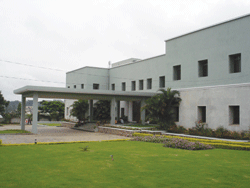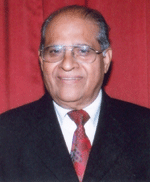With heavyweights from India Inc engaging in an annual stampede to snap up its graduates, the Xavier Institute of Management & Entrepreneurship has acquired an excellent reputation
 The twelfth batch of 113 students, who were awarded the postgraduate diploma of the Bangalore-based Xavier Institute of Management and Entrepreneurship (XIME) on May 10 this year, had an advantage over their predecessors. By the time they received their diplomas at an impressive convocation ceremony presided over by chief guest Kiran Karnik, former president of NASSCOM, they had already been campus recruited by blue-chip majors who came calling at the campus of XIME (estb. 1991), a nationally reputed B-school repeatedly ranked among the country’s top 25 by the pink newspapers and business periodicals.
The twelfth batch of 113 students, who were awarded the postgraduate diploma of the Bangalore-based Xavier Institute of Management and Entrepreneurship (XIME) on May 10 this year, had an advantage over their predecessors. By the time they received their diplomas at an impressive convocation ceremony presided over by chief guest Kiran Karnik, former president of NASSCOM, they had already been campus recruited by blue-chip majors who came calling at the campus of XIME (estb. 1991), a nationally reputed B-school repeatedly ranked among the country’s top 25 by the pink newspapers and business periodicals.
When the gates of the institute were thrown open to recruiters from corporate India in mid February, all the 113 XIME graduates who offered themselves for placement were snapped up at high prices. The average start-up remuner-ation of the batch of 2008 was Rs.5.6 lakh per year with the highest touching Rs.10.7 lakh. Among the most successful recruiters were India Inc heavyweights such as Infosys, Wipro, TCS and Vedanta — a testimony to the excellent reputation that the XIME management and faculty has built up for the institute during the past 17 years.
The accolades from Indian industry — reflected in the steadily rising average start-up salaries offered to the institute’s graduates year after year — is music to the ears of Prof. J. Philip, who after completing a nearly six-year term (1985-91) as director of the Indian Institute of Management, Bangalore, founded XIME in 1991.
 “Given my exposure to Harvard Business School, XLRI and IIM-B, I always felt I had it within me to promote a B-school which would incorporate the best teaching-learning practices and provide the value addition of exposing students to international business and management practices. Therefore when I promoted XIME in 1991 — the year in which the then finance minister Dr. Manmohan Singh presented a historic Union budget which began the process of integrating what was an isolationist Indian economy with the emerging global economy — I resolved to develop a curriculum with greater outward orientation and stronger emphasis on developing entrepreneurs rather than mere corporate profess-ionals, as was the dominant practice of B-schools at that time. And to this day they are the distinguishing characteri-stics of business management education at XIME,” says Philip an alumnus of Kerala University and XLRI Jamshedpur who pressed on to acquire the prestigious ITP (International Teaching Programme in Business Administration) diploma of Harvard Business School. Starting his professional career in 1960 in XLRI, Philip moved on to Hindustan Steel (later renamed SAIL) in 1971, and subsequently served as vice-president (human resources) of the globe-girdling Oberoi Group of hotels (1980-85) prior to being appointed director of IIM-B (1985-91).
“Given my exposure to Harvard Business School, XLRI and IIM-B, I always felt I had it within me to promote a B-school which would incorporate the best teaching-learning practices and provide the value addition of exposing students to international business and management practices. Therefore when I promoted XIME in 1991 — the year in which the then finance minister Dr. Manmohan Singh presented a historic Union budget which began the process of integrating what was an isolationist Indian economy with the emerging global economy — I resolved to develop a curriculum with greater outward orientation and stronger emphasis on developing entrepreneurs rather than mere corporate profess-ionals, as was the dominant practice of B-schools at that time. And to this day they are the distinguishing characteri-stics of business management education at XIME,” says Philip an alumnus of Kerala University and XLRI Jamshedpur who pressed on to acquire the prestigious ITP (International Teaching Programme in Business Administration) diploma of Harvard Business School. Starting his professional career in 1960 in XLRI, Philip moved on to Hindustan Steel (later renamed SAIL) in 1971, and subsequently served as vice-president (human resources) of the globe-girdling Oberoi Group of hotels (1980-85) prior to being appointed director of IIM-B (1985-91).
Relatively free from the constraints of reporting to the Union HRD ministry which governs the IIMs and starting with a modest initial investment of a few lakhs in 1991, Philip has developed XIME into a front-rank B-school with impressive infrastructure facilities. Thus far in its 17 years of operations, this B-school which admits 120 students of both sexes annually into its fully residential two-year PGDM (postgraduate diploma in management) study programme, has injected over 1,000 well-trained business management graduates into the bloodstream of Indian industry. In 2004 the institute was awarded the highest accreditation of the Delhi-based National Board of Accreditation (NBA) of the All India Council for Technical Education (AICTE). Two special features of the institute, for which the faculty prides itself are: no reservations or quota on the basis of religion, caste or other criteria; and affirmative action to encourage women graduates into XIME’s study programmes.
Although its beginnings were modest, over the past 17 years the supportive infrastructure constructed on the 4.3 acre XIME campus in Electronics City has blossomed impressively. Currently the institute houses 14 classrooms, each equipped with a public address system and data projectors and with seating capacities ranging from 40-150; a library with over 10,000 books and 150 journal subscrip-tions; an auditorium with a seating capacity of 300 and several conference rooms. Teresa Hall, the ladies’ hostel, with a capacity for 115 students is sited within the campus and the men’s hostel is located just beyond the main campus walls. The institute’s 240 students are instructed by a permanent faculty of 20 highly qualified professors and lecturers and over 30 visiting professors from Indian industry and partner B-schools abroad.
Yet perhaps the USP (unique selling proposition) of this top B-school is its broad focus and international orientation. In 2007, the institute’s ‘year of internationalisation’, the XIME management signed memoranda of understanding with six foreign universities — Wouerzburg Schweinfurt University of Applied Science, Germany; Cotrugli Business Academy, Zagreb, Croatia; Redlands School of Business, USA; Di Milano Biccoca University, Italy; Negocia School of Management, Paris and Audencia Nantes School of Management, France. At least four more partnerships are now in the pipeline. Consequently there is robust student and staff interaction with the institute’s affiliated B-school partners abroad.
With XIME’s teething pains now a distant memory, and the institute regularly ranked among the country’s top 25 by business dailies and periodicals, it’s hardly surprising that Prof. Philip looks to the future with optimism. “We have taken several new initiatives to expand our curriculum and capacity. Among them are introduction of a new one-year postgraduate certificate programme in construction management — perhaps the only one in the country — and developing an intensive full-time 15-month diploma programme for business executives with at least five years experience. These study programmes will increase our annual intake from 240 students currently to 330 this year. And with demand exceeding available capacity by a 5:1 ratio, in response to pressing invitations from across the country, we have drawn up plans to establish affiliated centres in Kerala and Tamil Nadu,” says Philip.
Quite clearly the XIME growth and development story is just beginning.
Admission and fees
The eligibility criterion for admission into the two year full-time residential postgraduate diploma in management (PGDM) programme of XIME is a bachelor’s degree from a recognised university with a minimum average of 50 percent (45 percent for SC/ST candidates). Candidates appearing for their final year examinations or awaiting their final results need to write the admission test of XLRI, Jamshedpur (XAT) or the Common Admission Test (CAT) conducted jointly by the seven Indian Institutes of Management. Application forms can be downloaded from the XIME website (www.xime.org).
Students who do well in the entrance exam will be called for group discussion and personal interview.
Tuition fee: First year: Rs.1.6 lakh; Second year: Rs.1.9 lakh
Caution deposit: Rs.15,000; Laptop fee: Rs.50,000
Hostel fee: Rs.4,000 per month
For further information contact XIME, Electronics City, Phase II, Hosur Road, Bangalore 560 100 Tel: + 91-80-2852 8477; e-mail: xime@xime.org; website: www.xime.org
|
Mekhala Roy (Bangalore)